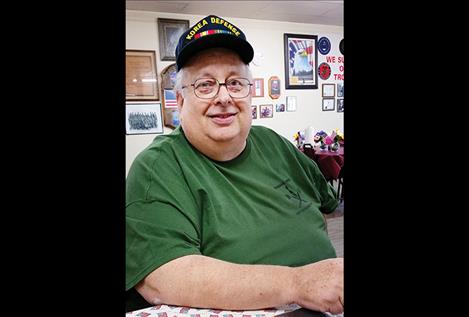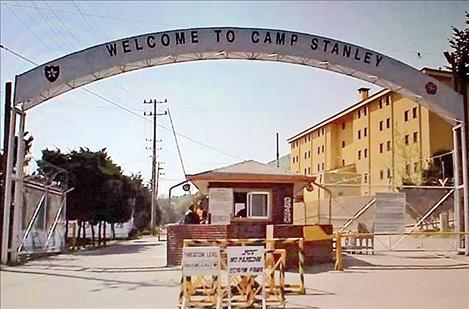Veteran Spotlight
Penrod Davis October 23, 1961 Korea Defense: - Specialist 4th Class U.S. Army - 11th Air Defense, 2nd Infantry Division 15th Field Artillery
Hey savvy news reader! Thanks for choosing local.
You are now reading
1 of 3 free articles.
Joining the Army seemed like a good idea to Penrod in November, 1984. He had family obligations, was making low pay in Ronan, and wanted to go to Germany. The increase in pay and getting insurance worked out, but he never made it to Germany even though the recruiter said it would be so.
Penrod spent three of his four years of enlistment at Fort Bliss, Texas. Fourteen weeks of basic training taught basic soldier skills: combat skills, becoming familiar with the code of military justice, how to bandage and patch up a guy to get him to the medics, etc. This time also included Advanced Individual Training (AIT) for the Hawk Missile Fire Control. He went through refresher courses about every three months during his tour of duty.
Following training, Penrod was assigned Permanent Party status at Fort Bliss working with Hawk missiles. If enemy planes were spotted, the 1-ton missiles would be launched. The best part of the job was being in an air-conditioned radar van in the hot desert. The men were “rapid deployment,” meaning they could be anywhere within 72 hours. They were loaded once but never had to deploy.
When the Hawk missiles were phased out the summer of 1987, Penrod went to Fort Lee, Virginia for retraining as an equipment parts and records specialist. He says this mostly involved paperwork for the motor pool.
One day, surprise! Penrod, you’re going to Korea! He wasn’t ready for that and took a leave to go home, but the 2nd Infantry Division was waiting for him when he got back. The end of October, 1987, he flew commercial from Missoula, Montana to Seattle, Washington and from there through Alaska to Japan via the “Flying Tigers.” This old Boeing 747 was a modern version of the planes the original Flying Tigers flown in WWII. When they landed in Japan, the pilot said he was glad they made it. This was the plane’s last flight before being sent to Guam for rebuilding. All Penrod remembers of the overnight at an airport hotel in Japan was getting a $25 meal voucher which barely covered the miniscule portions of food that were served.
From Japan, Penrod arrived at Camp Stanley, South Korea, home of 155mm self-propelled Howitzer guns. There was a “cease fire” in 1954, but Korea is still considered a War Zone today. During a relocation of the battalion, his battery spent 45 days at “4 papa 3” near Panmunjom in the De-Militarized Zone (DMZ.) The blue buildings that straddle the Military Demarcation Line (the 38th Parallel) are still used today as a joint security area for peace talks between North and South Korea. They are considered one of the last remnants of the Cold War. On a bus tour, Penrod was able to go into the “North Korea” side of the building where they were locked in for about five minutes. When he and the others returned to the South Korea side, the door was locked behind them.
Penrod’s last assignment was at Camp Casey in Tong du Chon, South Korea. During these five months he had the same Howitzer duty as before. He left South Korea the first part of October, 1988, during the Olympics, which he never got to see. His time in South Korea was considered a one-year “hardship tour” because the soldiers didn’t get to see family during that time.
Today Penrod is still in contact with two of the KATUSA’s (Korean Augmentation to the U.S. Army personnel) who worked with him. They served as interpreters, country guides and helped with day-to-day office work.
Penrod remembers the “short-timer’s map.” When the year’s 365 blocks covering a map of South Korea were finally all colored in, it was time to go home. When his time was up, he flew back to Oakland, California, to be out-processed. This involves making sure records are correct, determining insurance status, and getting final pay. His process was rushed from the usual three days to one day because his aunt died and he needed to get home.
After finishing his enlistment, Penrod served six years with the National Guard. He was full time in Helena for two of those years, working on logistics for the thousands of vehicles being sent back to the U.S. after Desert Storm in the Middle East. He was part of SWAREB, the Southwest Asia Rebuild program. His job was computer entry for about 800 requests for parts per day, checking for order accuracy. One time he caught a request for a $100,000 rotor and discovered it was for a helicopter instead of the less expensive one his vehicles needed. When he finally resigned, it was again because of health reasons.
It took Penrod time to adjust to being back home. He still misses the camaraderie from the service and lifetime friends. He keeps in touch with his Section Chief from Fort Bliss. He also keeps up online with groups like “Disgruntled Veterans” and “Dysfunctional Veterans.”
“It’s hard to shut your mind off,” he says. When someone on the website has suicidal thoughts or needs someone to talk to, everybody jumps in to help.
Although he would advise young people to join because it would help them grow up, he wouldn’t want to go now because of the Middle East situation and the potential for physical and mental harm.
Looking back, Penrod says he’d probably do the same things. He got out because his health was deteriorating and he couldn’t keep up with everything. He liked the military but was tired of living other places – places not of his choice. His regrets are that he never got to go to Germany, and the amount of alcohol involved in his lifestyle at that time. Penrod is a cancer survivor and faces continuing health issues with the positive attitude of just something more to get through. “I don’t have time to die,” he says.
Thank you for your service, Penrod.

















